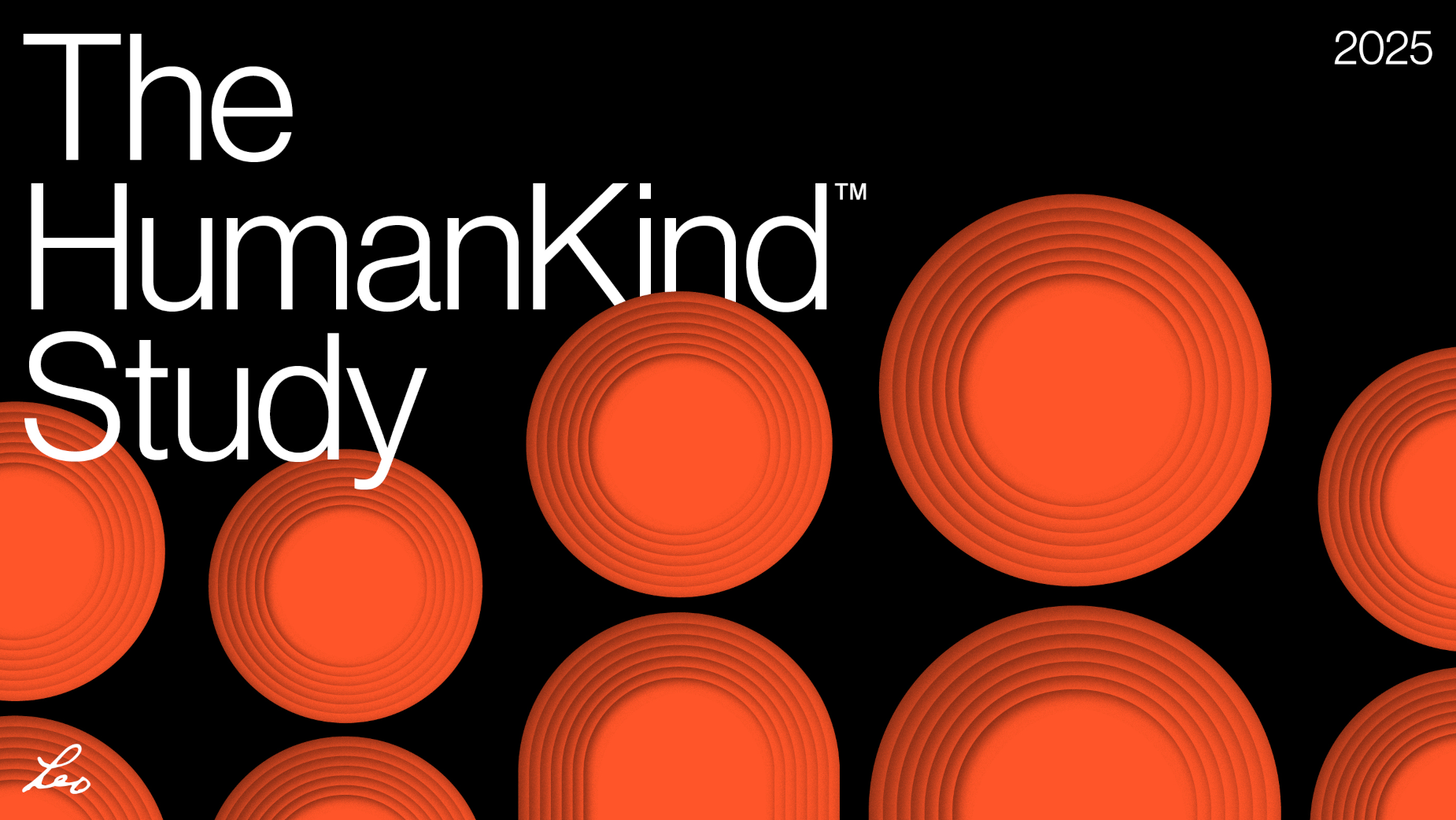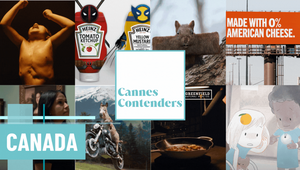
Breaking Down the Big Opportunities in Leo Toronto's 2025 HumanKind Study

Back in April, Leo Toronto made some noise when it dropped the 2025 version of its HumanKind Study. As the fourth edition of this national research initiative, this year’s deep dive collected insights from 2,500-plus respondents, placing an emphasis on what keeps Canadians up at night – especially amongst new Canadians and those between the ages of 16 to 45 years old.
While it’s worth reading the whole report, a few critical takeaways include the fact that these younger demographics are reporting extreme levels of stress and anxiety – due to rising social pressures to excel in all walks of life – and are facing burnout, exhaustion, and a general sense of defeat. However, the real kicker – something brands and their advertising partners need to be aware of – is that 73% of gen z and millennial Canadians are uncertain or convinced that brands fail to understand their concerns. This is four percentage points worse than last year, and is a clear sign that the country’s marketing industry could improve how it handles its approach to messaging, both for the sake of audiences, and to bolster consumer retention, brand loyalty and financial bottom lines.
With this in mind, LBB’s Jordan Won Neufeldt sat down with Leo Toronto senior strategist Sarah Carpentier to learn about the methodology behind the study, and find out about the driving factors behind these key takeaways.
LBB> Notably, this year’s iteration of the study looks specifically at insights pertaining to young Canadians. Why was this the right demographic to focus on during this moment in time?
Sarah> Last year, the study revealed standout rates of concern and anxiety across a wide range of issues. However, for gen z – particularly and alarmingly – the rate of loneliness was very high, with 77% admitting feeling lonely some or most of the time.
As we delved into the data and engaged with our clients about the challenges and problems covered in last year's study, it became increasingly evident that there is a substantial gap between the needs, desires, and expectations of younger people, and the ways in which brands are engaging with them to help provide meaningful, tangible support. So, as we planned for the fourth edition, we decided to change our approach, reorient our in-field strategy, and more deeply investigate the issues most affecting the younger Canadians and recent arrivals.
LBB> Building on this, what was your research process like? Have you evolved your approach over the years to glean sharper insights?
Sarah> Research is a cycle – every answer we find generates new questions and fine tunes for the next year. For example, as mentioned, after three years of studying all Canadians, coming out of last year’s results, we knew we wanted to double-click on the younger half of Canadians.
In short, each year, our approach balances the confidence from quantitative research with the texture and exploration from qualitative research, based on the specific questions and hypotheses we have each year.
LBB> Let’s talk about the findings themselves. Was there anything you found particularly surprising, or which stood out to you?
Sarah> Some of the effects this year had a strength that was a bit unexpected. We definitely had hoped that loneliness had improved – and we were so pleased to see that was the case – but then, at the same time, we saw an unexpected dip in Canadians feeling like people think or care about their needs. These are part of several metrics this year that tell us brands need to take into account that they are operating in a distrustful and cynical environment, where younger Canadians really don’t think anyone is approaching them with their best interests at heart.
One other unexpected result was how concerned young people are about the impact of AI on their own perspectives and critical thinking. Older generations spend a lot of time talking from the outside about the relationships that young people have with digital technologies, like social media and AI, but there aren’t as many places that let young people speak for themselves. It was very insightful to hear directly from gen z on how they feel about these things: how they want to use it, and how they don’t want to use it. As one gen z respondent put it, “We’ve grown up with the internet; maybe we will know what is good about it and bad about it better than anyone else.”

LBB> The study also highlights the pressure, cynicism and anxiety gen z and millennials are facing. What factors are driving this, and why is it pushing these demographics to just focus on controllable aspects of their lives?
Sarah> These demographics have high anxiety that is so impactful and persistent because, to them, it’s being driven by many different aspects of their lives. Younger generations see, to put it succinctly, a world that is out to get them. As a result, they’re always anxiously preparing (or overpreparing) for the worst. Many young Canadians have experienced or witnessed significant losses to their finances, careers, social lives, and health. And growing up on social media, even when people might not be directly impacted by loss, they can still feel a very close-to-home impact as a bystander. Anxiety has become a way of life to try and avoid further loss.
In The HumanKind Study this year, we hear from younger generations that they are trying to cope better by adapting their thinking to focus on improving the controllable aspects of their daily lives. There are big problems that they still care a lot about, but it isn’t emotionally sustainable to worry that much about so many issues, none of which they expect to improve any time soon. Young Canadians need to feel the satisfaction and replenish by checking off a smaller to-do list.
LBB> With that in mind, what can Canada’s brands and agencies do to address this? Even if they can’t solve the problem, are there steps that can be taken which would make a difference?
Sarah> People are hunkering down, only trusting a core group to look out for their interests. They would much rather have help – from brands, or anyone – but right now, they’re going at it alone because they don’t feel like brands are along for the ride. This is both an indictment of and an opportunity for us as brand builders. If we want to build long-lasting relationships with mutual respect, honesty and trust, we need to know what they’re dealing with and show up.
LBB> Several of the study’s other takeaways, including discussions of burnout and the disillusionment with the ‘hard work paradigm’, are also relevant within the ad industry. Internally, how are you working to challenge this and set a better example?
Sarah> The important takeaways from this research are an understanding of the mindset of working Canadians, and they have given us a pretty resounding picture of their modern working world. A lot of what we hear actually reflects a fairly practical, albeit cold, approach to the transactional nature of work. For instance, of younger Canadians, 83% are unsure or believe that their hard work will be exploited instead of rewarded, so they are shifting their behaviour and evolving the nature of work to match. This gives advertisers and brands many opportunities to connect with them overall, and yes, a sublevel within this can be as employers.
Another clear message we hear is that employers stuck with different views may be pushing harder and harder for an old way of working, motivating and trying to inspire without getting closer to the results they want. Similarly, brands promoting attitudes and lifestyles that people are increasingly turning away from could leave them feeling left behind as well.
Leo Toronto is part of The Globe and Mail’s employee-voted ‘Great Places to Work’. That isn’t because it unrealistically exists outside the challenges of the modern economic system, but because it’s operated by people with genuine openness to understanding employee perspectives, needs, and who want to do their best to create the best environment. As we expand to all of the problems raised in The HumanKind Study, brands may not always feel like they can solve all the problems presented to them, but letting people know they see and care about their perspectives has proven time and again to go a long way.

LBB> Specifically, why do you think these are such big issues within the Canadian landscape? Do you think similar findings would be found if this study was run in other countries?
Sarah> The goal of The HumanKind Study is to give voice to Canadians. Too often, marketers and advertisers use American data as a stand in for Canadians, and hope that will be good enough… and based on experience, we know it's not. In 2024 (and coming soon in 2025) we also published a US edition of The HumanKind Study, and it’s always interesting to see where there are some high-level similarities, but also several differences in the results. We certainly expect to uncover different findings when this study is run in other countries.
LBB> Finally, if there was one takeaway you’d want to emphasise for viewers, what would it be, and why?
Sarah> In the past, younger Canadians felt more understood by brands than older generations did, but it looks like brands are losing that ground. In 2025, 73% of gen z and millennial Canadians are either unsure or don’t believe brands clearly understand the concerns, issues, or problems facing them, which is worse by four percentage points compared to last year. This is a big opportunity for brands and advertisers to do better.















